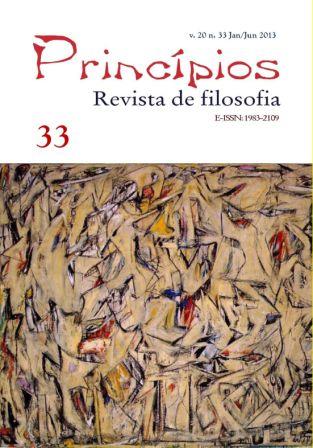FEELING RESPONSIBLE AND INTEGRATED: A CHALLENGE TO INTELLECTUALISM ABOUT AGENCY
Palavras-chave:
Practical rationality, Intellectualism, Automatic actions, Practical responsibilityResumo
Reflection is put at the forefront of rational agency (in the sense of acting for a reason) by what we will call here ‘the intellectualist tradition’. According to this tradition, there is a sort of qualitative distinction between actions which are the result of reflection and those which are simply motivated by pro-attitudes like desires. One long-standing problem with such qualitative distinction is concerned with the so many swift, quasi-automatic actions we perform in everyday life. How can these be accommodated within the intellectualist framework? In the context of these actions and of providing an answer to that question, our aim here is to highlight another problem with that qualitative distinction: one which is related to our natural feelings of responsibility for our actions. In the end, we shall suggest that only an account of rational agency that holds an “internal”, straightforward relation between desires and actions would be able to make sense of those feelings.Downloads
Referências
BARH, J. A. & CHARTRAND, T. L. The Unbearable Automaticity of Being, American Psychologist, 54(7): 462-479. 1999.
BARGH, J. A. , LEE-CHAI, A., BARNDOLLAR, K., GOLLWITZER, P. M., TRÖTSCHEL, R. The Automated Will: Nonconscious Activation and Pursuit of Behavioral Goals, Journal of Personality and Social Psychology, 81(6): 1014–1027. 2001.
BARGH, J. A. & MORSELLA, E. ‘The Unconscious Mind’, Perspectives on Psychological Science, 3(1): 73–79. 2008.
DAVIDSON, D. Actions, Reasons, and Causes, In Essays on Actions and Events, Oxford: Clarendon Press. 1980.
EVANS J. ST.B. T. & OVER, D. E. Rationality and Reasoning, Hove: Psychology Press. 1996.
FAZIO, R. H., SANBONMATSU, D. M., POWELL, M. C., KARDES, F. R. ‘On the Automatic Activation of Attitudes’, Journal of Personality and Social Psychology, 50 (2): 229-238. 1986.
FERGUSON, M. J. The Automaticity of Evaluation, In J. A. BARGH (Ed.), Social Psychology and the Unconscious: The Automaticity of Higher Mental Processes, New York: Psychology Press. 2006.
KANT, I. Groundwork of the Metaphysics of Morals, translated and edited by Mary Gregor, Cambridge: Cambridge University Press. 1998.
KANT, I. The Metaphysics of Morals, translated and edited by Mary Gregor, Cambridge: Cambridge University Press. 1996.
KORSGAARD, C. M. The Sources of Normativity, Cambridge: Cambridge University Press. 1996.
NISBETT. R. E. & WILSON, T. D. Telling More Than We Can Know: Verbal Reports on Mental Processes, Psychological Review, 84(3): 231-259. 1977.
RAILTON, P. ‘Normative Guidance’, In R. Shafer-Landau (ed.), Oxford Studies in Metaethics, Volume 1, Oxford: Oxford University Press. 2006.
ROSS L. & NISBETT R. E. The Person and The Situation: Perspectives of Social Psychology, London: Pinter & Martin Ltd. 1991/2011.
SCANLON, T. What We Owe To Each Other, Cambridge, Mass.: Harvard University Press. 2000.
VELLEMAN, J. D. What Happens When Someone Acts? In The Possibility of Practical Reason, Oxford: Clarendon Press. 2000.
WILLIAMS, B. Moral Luck, In Moral Luck: Philosophical Papers 1973-1980. Cambridge: Cambridge University Press. 1981.
WILLIAMS, B. Shame and Necessity, Berkeley: University of California Press. 1994.
Downloads
Publicado
Como Citar
Edição
Seção
Licença
Autores mantêm os direitos autorais e concedem à revista o direito de primeira publicação, com o trabalho simultaneamente licenciado sob a Licença Creative Commons Attribution que permite o compartilhamento do trabalho com reconhecimento da autoria e publicação inicial nesta revista.
Termos da licença:
| Não Comercial (NC) | Os licenciados podem copiar, distribuir, exibir e executar a obra e fazer trabalhos derivados dela, desde que sejam para fins não comerciais. |
| Compartilha Igual (SA) | Os licenciados devem distribuir obras derivadas somente sob uma licença idêntica à que governa a obra original ou menos restritiva. |


 Português (Brasil)
Português (Brasil) English
English Español (España)
Español (España) Français (Canada)
Français (Canada)


